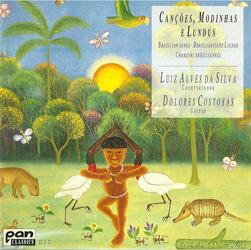 Um raro, histórico e agradável CD
Um raro, histórico e agradável CD
Brazil – the unknown giant
REPOSTAGEM
If we look at Brazil from a musical point of view we discover a rich, varied and fascinating country well worth investigating. We do not know whether Brazil’s musical history is as ancient as Europe’s: the conquering Portuguese — like their Spanish counterparts in the surrounding countries — have destroyed the old local cultures in order to replace it with their own. But there are indications suggesting that the indigenous Indios — mostly from the Guarani Tribe — had their own music which they used for celebrations that greatly impressed the first European visitors. The French mariner Jean de Kery landed here in 1556 and called the country a “land full of music”. But unfortunately we know nothing about the music of the Indios. The church quickly realized that music was the easiest way to overcome pagan traditions. Religious music in Brazil flourished especially in the region of Minas Geiras, around the beautiful old little town of Ouro Preto. In the archives of the local churches innumerable works can be found; particularly rich was the so called «Barocco Mineiro», arround 1800.
After 1820 the new Empire of Brazil encouraged a rich musical life at the courts and in the palaces. The Mulatto José Mauricio Nunes Guarcia, in his quality of Master of the Court Chapel, wrote a lot of splendid church music; in the Salons the “Modinhas”, a form of melodic songs imported from Lisbon and closely related to middle European Romanticism, became very popular. At the same time Brazilian music became internationally succesful: Emperor Dom Pedro II, a great lover of music (who had unsuccesfully invited Richard Wagner to come to his residence in Rio de Janeiro) sent the young Carlos Gomes to Milan to study music. There his opera “Il Guarani” was premiered at the Scala in 1870. The success was such that even Verdi presented his congratulations. Brazil had its “National Opera”.
 When towards the end of the century Dom Pedro II had to yield to lhe Republic, a concentration of the musical life, took place. As in most European and all Latin American countries a “nationaliste” generation made its appearance. Its goal was the creation of a Brazilian Music based on national elements. Amongst this groupe we find Alberto Nepomuceno, Francisco Braga, Alexandre Levy, Itiberé da Cunha, Ernesto Nazareth. The following generation produced some of the most distinguished Brazilian composers: Oscar Lorenzo Fernandez, Francisco Mignone, Camargo Guarnieri, José Siqueira, Radames Gnatalli, Waldemar Henrique, Vieira Brandão, Hekel Tavares and at least a dozen more.
When towards the end of the century Dom Pedro II had to yield to lhe Republic, a concentration of the musical life, took place. As in most European and all Latin American countries a “nationaliste” generation made its appearance. Its goal was the creation of a Brazilian Music based on national elements. Amongst this groupe we find Alberto Nepomuceno, Francisco Braga, Alexandre Levy, Itiberé da Cunha, Ernesto Nazareth. The following generation produced some of the most distinguished Brazilian composers: Oscar Lorenzo Fernandez, Francisco Mignone, Camargo Guarnieri, José Siqueira, Radames Gnatalli, Waldemar Henrique, Vieira Brandão, Hekel Tavares and at least a dozen more.
Prof. Kurt Pahlen (translated by Francois Lilienfeld)(extraído do encarte)
Heitor Villa-Lobos (Rio de Janeiro, 1887-1959)
01. Lundú da Marqueza de Santos
02. Viola quebrada
03. Realejo
Ernesto Nazareth (Rio de Janeiro, 1863-1934)
04. Escorregando – solo de guitare
Francisco Mignone (S. Paulo, 1897-Rio de Janeiro, 1986)
05. Canto baixinho
Heitor Villa-Lobos (Rio de Janeiro, 1887-1959)
06. A gatinha parda
Ernesto Nazareth (Rio de Janeiro, 1863-1934)
07. Odeon – Dança Brasileira – solo de guitare
08. A casinha pequenina
Heitor Villa-Lobos (Rio de Janeiro, 1887-1959)
09. Redondilha
Augusto Marcellino (S. Paulo, 1911-Buenos Aires, 1973)
10. Remeleixo (Chôro Nr. 9) – solo de guitare
Anonyme
11. Ô lelê lilá
Trad. arr. Heitor Villa-Lobos (Rio de Janeiro, 1887-1959)
12. Papae Curumiassu
Anonyme
13. Nozani-ná
Trad. arr. Heitor Villa-Lobos (Rio de Janeiro, 1887-1959)
14. Cantilena
15. Estrela é lua nova
João Teixeira Guimarães ou João Pernambuco (Jatobá, atual Petrolândia, PE, 1883-Rio de Janeiro,1947)
16. Interrogando (longo) – solo de guitare
Anonyme (19ième Siècle)
17. Si te adoro
18. Roseas flores d’alvorada
19. Hei de amar-te até morrer
Gabriel Fernandes da Trindade (Portugal ,c.1790-Rio de Janeiro, 1854)
20. Graças aos ceos
Padre Telles (Bahia, c.1800 – Rio de Janeiro, c.1860)
21. Eu tenho no peito
José Francisco Leal (Rio de Janeiro, 1792-1829)
22. Deliro e Suspiro
Emílio Eutiquiano Correia do Lago (Franca, SP, 1837 -S. Paulo, 1871)
23. Último adeus de amor
José Francisco Leal (ca.1850-ca.1900)
24. Esta noite, Oh ceos!
A. J. S. Monteiro (Rio de Janeiro, ca.1830-ca.1890
25. Que noites eu passo
João Teixeira Guimarães ou João Pernambuco (Jatobá, atual Petrolândia, PE, 1883-Rio de Janeiro,1947)
26. Sons de Carrilhoes (Chôro) – solo de guitareaos ceos
Padre Telles (Bahia, c.1800 – Rio de Janeiro, c.1860)
21. Eu tenho no peito
José Francisco Leal (Rio de Janeiro, 1792-1829)
22. Deliro e Suspiro
Emílio Eutiquiano Correia do Lago (Franca, SP, 1837 -S. Paulo, 1871)
23. Último adeus de amor
José Francisco Leal (ca.1850-ca.1900)
24. Esta noite, Oh ceos!
A. J. S. Monteiro (Rio de Janeiro, ca.1830-ca.1890
25. Que noites eu passo
João Teixeira Guimarães ou João Pernambuco (Jatobá, atual Petrolândia, PE, 1883-Rio de Janeiro,1947)
26. Sons de Carrilhoes (Chôro) – solo de guitare
Canções, Modinhas e Lundús (Brazilian songs) – 1992
Luiz Alves da Silva, countertenor
Dolores Costoyas, guitar
Álbum fora de catálogo desde 1992.
.

BAIXE AQUI – DOWNLOAD HERE
XLD RIP | FLAC 231,3 MB | HQ Scans 17,8MB |
BAIXE AQUI – DOWNLOAD HERE
MP3 320 kbps – 152,1 + 17,8 MB – 1h 02 min
powered by iTunes 11.1.4
.
.Outro CD do acervo do musicólogo Prof. Paulo Castagna. Não tem preço !!!
Boa audição.
.
.
Avicenna
